-
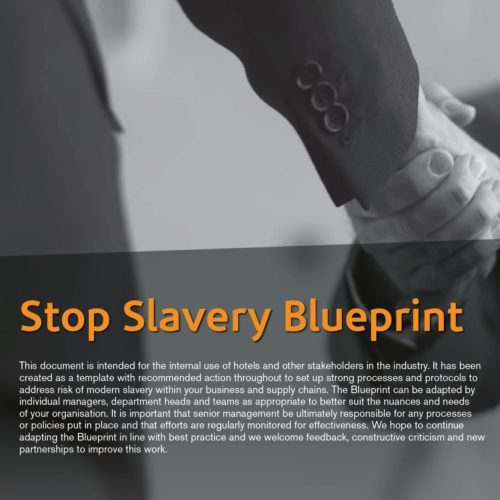 The Stop Slavery Blueprint has been created by Shiva Foundation and was initially trialled in a group of hotels, with its implementation coordinated and supported by the Foundation. The Blueprint sets out the key principles for hoteliers wishing to implement their own anti-slavery initiatives. It provides guidance and recommendations in the form of: • Policies and practices, • Procedures and protocols, and • A checklist of suggested actions. The Blueprint also sets out guidance on transparency, reporting, performance measurement, business partner engagement, risk assessment, business authentication, and investigation and remediation. It is meant to be used in conjunction with the Stop Slavery General Manager Handbook which provides practical guidance and materials.
The Stop Slavery Blueprint has been created by Shiva Foundation and was initially trialled in a group of hotels, with its implementation coordinated and supported by the Foundation. The Blueprint sets out the key principles for hoteliers wishing to implement their own anti-slavery initiatives. It provides guidance and recommendations in the form of: • Policies and practices, • Procedures and protocols, and • A checklist of suggested actions. The Blueprint also sets out guidance on transparency, reporting, performance measurement, business partner engagement, risk assessment, business authentication, and investigation and remediation. It is meant to be used in conjunction with the Stop Slavery General Manager Handbook which provides practical guidance and materials. -
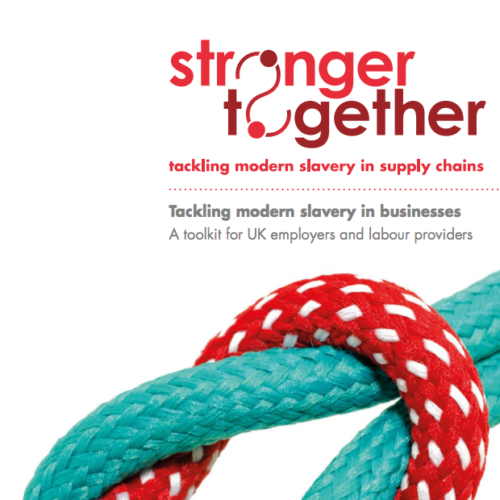 Stronger Together is a multi-stakeholder initiative which aims to reduce modern slavery. It provides guidance, training and resources to organisations, employers, labour providers, workers and their representatives. This free collection of resources includes pragmatic guidance and toolkits, and resources for the workplace including multilingual posters, leaflets and template policies.
Stronger Together is a multi-stakeholder initiative which aims to reduce modern slavery. It provides guidance, training and resources to organisations, employers, labour providers, workers and their representatives. This free collection of resources includes pragmatic guidance and toolkits, and resources for the workplace including multilingual posters, leaflets and template policies.Credit: Stronger Together
-
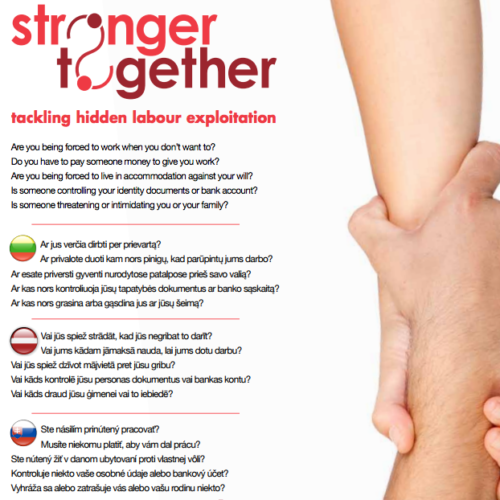 Stronger Together is a multi-stakeholder initiative which aims to reduce modern slavery. It provides guidance, training and resources to organisations, employers, labour providers, workers and their representatives. This free collection of resources includes pragmatic guidance and toolkits, and resources for the workplace including multilingual posters, leaflets and template policies. This poster is intended for the workplace, and asks employees five basic questions to raise awareness of exploitation and encourage those who may be unwittingly exploited to report their abuse. It is published in four different languages which can be chosen from a range of combinations.
Stronger Together is a multi-stakeholder initiative which aims to reduce modern slavery. It provides guidance, training and resources to organisations, employers, labour providers, workers and their representatives. This free collection of resources includes pragmatic guidance and toolkits, and resources for the workplace including multilingual posters, leaflets and template policies. This poster is intended for the workplace, and asks employees five basic questions to raise awareness of exploitation and encourage those who may be unwittingly exploited to report their abuse. It is published in four different languages which can be chosen from a range of combinations.Credit: Stronger Together
-
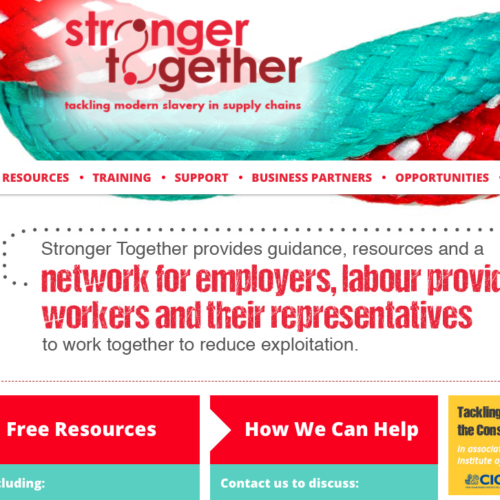 Stronger Together is a multi-stakeholder initiative which aims to reduce modern slavery. It provides guidance, training and resources to organisations, employers, labour providers, workers and their representatives. This free collection of resources includes pragmatic guidance and toolkits, and resources for the workplace including multilingual posters, leaflets and template policies.
Stronger Together is a multi-stakeholder initiative which aims to reduce modern slavery. It provides guidance, training and resources to organisations, employers, labour providers, workers and their representatives. This free collection of resources includes pragmatic guidance and toolkits, and resources for the workplace including multilingual posters, leaflets and template policies.Credit: Stronger Together
-
 Stronger Together is a multi-stakeholder initiative which aims to reduce modern slavery. It provides guidance, training and resources to organisations, employers, labour providers, workers and their representatives. This free collection of resources includes pragmatic guidance and toolkits, and resources for the workplace including multilingual posters, leaflets and template policies. Anti-human trafficking/forced labour video for induction and worker training programmes. It offers two case studies of exploitation of migrant workers in the UK, and advises on sources of help such as the GLA, Migrant Help or police.
Stronger Together is a multi-stakeholder initiative which aims to reduce modern slavery. It provides guidance, training and resources to organisations, employers, labour providers, workers and their representatives. This free collection of resources includes pragmatic guidance and toolkits, and resources for the workplace including multilingual posters, leaflets and template policies. Anti-human trafficking/forced labour video for induction and worker training programmes. It offers two case studies of exploitation of migrant workers in the UK, and advises on sources of help such as the GLA, Migrant Help or police.Credit: Stronger Together
-
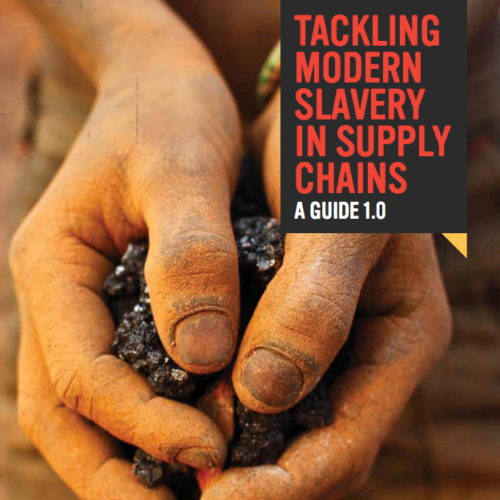 The Walk Free Foundation was established by Andrew Forrest, the Chairman of Fortescue Metals Group, after he found labour exploitation within his own supply chains and took a number of steps to prevent modern slavery affecting his business. This comprehensive guide considers corporate policy on modern slavery and provides both guidance and tools to implement it. It includes advice on corporate policy and provides template examples of a number of tools.
The Walk Free Foundation was established by Andrew Forrest, the Chairman of Fortescue Metals Group, after he found labour exploitation within his own supply chains and took a number of steps to prevent modern slavery affecting his business. This comprehensive guide considers corporate policy on modern slavery and provides both guidance and tools to implement it. It includes advice on corporate policy and provides template examples of a number of tools.Credit: Walk Free Foundation & Verite
-
 The Walkfree Foundation was established by Andrew Forrest, the Chairman of Fortescue Metals Group, after he found labour exploitation within his own supply chains and took a number of steps to prevent modern slavery affecting his business. This comprehensive guide considers corporate policy on modern slavery and provides both guidance and tools to implement it. It includes advice on corporate policy and provides template examples of a number of tools. Credit: Walkfree Foundation & Verite
The Walkfree Foundation was established by Andrew Forrest, the Chairman of Fortescue Metals Group, after he found labour exploitation within his own supply chains and took a number of steps to prevent modern slavery affecting his business. This comprehensive guide considers corporate policy on modern slavery and provides both guidance and tools to implement it. It includes advice on corporate policy and provides template examples of a number of tools. Credit: Walkfree Foundation & Verite -
 Stronger Together is a multi-stakeholder initiative which aims to reduce modern slavery. It provides guidance, training and resources to organisations, employers, labour providers, workers and their representatives. This free collection of resources includes pragmatic guidance and toolkits, and resources for the workplace including multilingual posters, leaflets and template policies. This toolkit gives an overview of Stronger Together's purpose, providing guidance on best practice for UK employers and labour providers on uncovering, preventing and reporting potential cases of modern slavery within their own business and supply chains. It defines modern slavery and forced labour in supply chains and third party agencies, and gives information on the processes of reporting modern slavery and supporting potential victims. It includes templates for policies and procedures, which can be found separately on this resource hub.
Stronger Together is a multi-stakeholder initiative which aims to reduce modern slavery. It provides guidance, training and resources to organisations, employers, labour providers, workers and their representatives. This free collection of resources includes pragmatic guidance and toolkits, and resources for the workplace including multilingual posters, leaflets and template policies. This toolkit gives an overview of Stronger Together's purpose, providing guidance on best practice for UK employers and labour providers on uncovering, preventing and reporting potential cases of modern slavery within their own business and supply chains. It defines modern slavery and forced labour in supply chains and third party agencies, and gives information on the processes of reporting modern slavery and supporting potential victims. It includes templates for policies and procedures, which can be found separately on this resource hub.Credit: Stronger Together
-
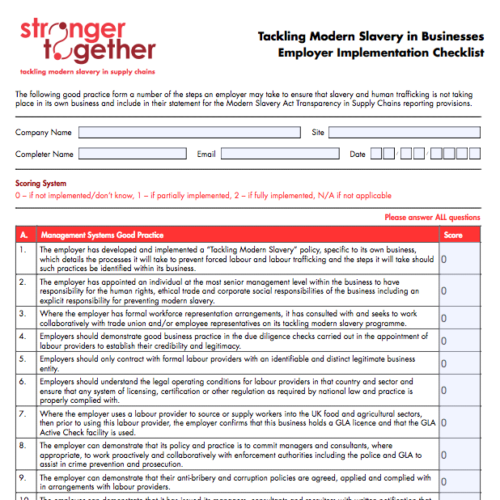 Stronger Together is a multi-stakeholder initiative which aims to reduce modern slavery. It provides guidance, training and resources to organisations, employers, labour providers, workers and their representatives. This free collection of resources includes pragmatic guidance and toolkits, and resources for the workplace including multilingual posters, leaflets and template policies. This is a good practice checklist that can be used by employers to ensure modern slavery and human trafficking is not happening in any area of their own business, and to include in their statement for the Modern Slavery Act Transparency in Supply Chains reporting provisions. It splits up the checklist into: management systems , training to build capacity and capability, labour sourcing, recruitment processes, worker records analysis to alert risks, workplace monitoring, worker engagement, providing access to remedy.
Stronger Together is a multi-stakeholder initiative which aims to reduce modern slavery. It provides guidance, training and resources to organisations, employers, labour providers, workers and their representatives. This free collection of resources includes pragmatic guidance and toolkits, and resources for the workplace including multilingual posters, leaflets and template policies. This is a good practice checklist that can be used by employers to ensure modern slavery and human trafficking is not happening in any area of their own business, and to include in their statement for the Modern Slavery Act Transparency in Supply Chains reporting provisions. It splits up the checklist into: management systems , training to build capacity and capability, labour sourcing, recruitment processes, worker records analysis to alert risks, workplace monitoring, worker engagement, providing access to remedy.Credit: Stronger Together
-
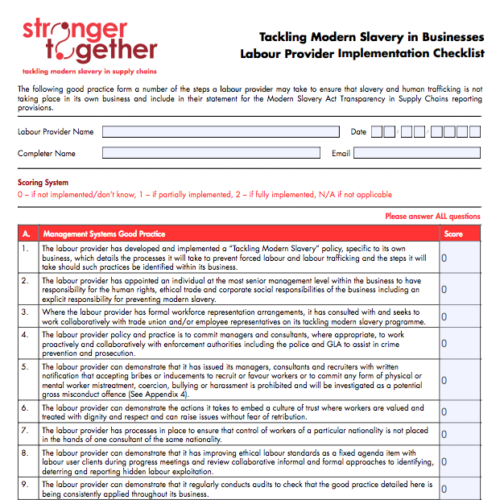 Stronger Together is a multi-stakeholder initiative which aims to reduce modern slavery. It provides guidance, training and resources to organisations, employers, labour providers, workers and their representatives. This free collection of resources includes pragmatic guidance and toolkits, and resources for the workplace including multilingual posters, leaflets and template policies. This is a good practice checklist that can be used by labour providers to ensure modern slavery and human trafficking is not happening in any area of their own business, and to include in their statement for the Modern Slavery Act Transparency in Supply Chains reporting provisions. It splits up the checklist into: management systems, training to build capacity and capability, labour sourcing, recruitment processes, worker records analysis to alert risks, worker allocation, workplace monitoring, worker engagement, providing access to remedy.
Stronger Together is a multi-stakeholder initiative which aims to reduce modern slavery. It provides guidance, training and resources to organisations, employers, labour providers, workers and their representatives. This free collection of resources includes pragmatic guidance and toolkits, and resources for the workplace including multilingual posters, leaflets and template policies. This is a good practice checklist that can be used by labour providers to ensure modern slavery and human trafficking is not happening in any area of their own business, and to include in their statement for the Modern Slavery Act Transparency in Supply Chains reporting provisions. It splits up the checklist into: management systems, training to build capacity and capability, labour sourcing, recruitment processes, worker records analysis to alert risks, worker allocation, workplace monitoring, worker engagement, providing access to remedy.Credit: Stronger Together
-
 Stronger Together is a multi-stakeholder initiative which aims to reduce modern slavery. It provides guidance, training and resources to organisations, employers, labour providers, workers and their representatives. This free collection of resources includes pragmatic guidance and toolkits, and resources for the workplace including multilingual posters, leaflets and template policies. This toolkit provides guidance and good practice for responsible businesses to develop a robust strategy to prevent, uncover, and report modern slavery, particularly forced labour and human trafficking, which may be occurring within their supply chains. It is intended primarily for staff working within a CSR capacity but can also be used by staff working in social compliance, procurement HR and risk management.
Stronger Together is a multi-stakeholder initiative which aims to reduce modern slavery. It provides guidance, training and resources to organisations, employers, labour providers, workers and their representatives. This free collection of resources includes pragmatic guidance and toolkits, and resources for the workplace including multilingual posters, leaflets and template policies. This toolkit provides guidance and good practice for responsible businesses to develop a robust strategy to prevent, uncover, and report modern slavery, particularly forced labour and human trafficking, which may be occurring within their supply chains. It is intended primarily for staff working within a CSR capacity but can also be used by staff working in social compliance, procurement HR and risk management.Credit: Stronger Together
-
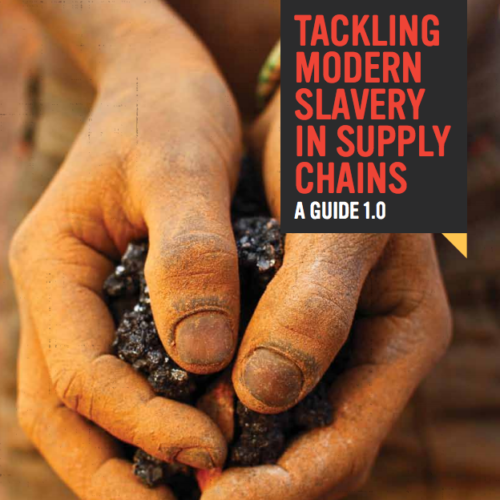 The Walk Free Foundation was established by Andrew Forrest, the Chairman of Fortescue Metals Group, after he found labour exploitation within his own supply chains and took a number of steps to prevent modern slavery affecting his business. This comprehensive guide considers corporate policy on modern slavery and provides both guidance and tools to implement it. It includes advice on corporate policy and provides template examples of a number of tools.
The Walk Free Foundation was established by Andrew Forrest, the Chairman of Fortescue Metals Group, after he found labour exploitation within his own supply chains and took a number of steps to prevent modern slavery affecting his business. This comprehensive guide considers corporate policy on modern slavery and provides both guidance and tools to implement it. It includes advice on corporate policy and provides template examples of a number of tools.Credit: Walk Free Foundation and Verite
-
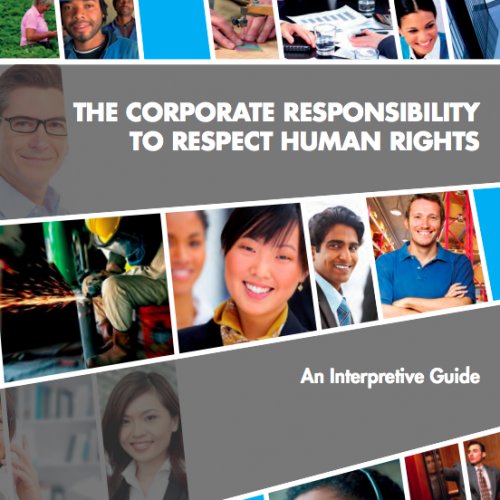 This publication is the official guidance accompanying the UN Guiding Principles on Business and Human Rights; it is designed to support effective implementation.
This publication is the official guidance accompanying the UN Guiding Principles on Business and Human Rights; it is designed to support effective implementation.Credit: OHCHR
-
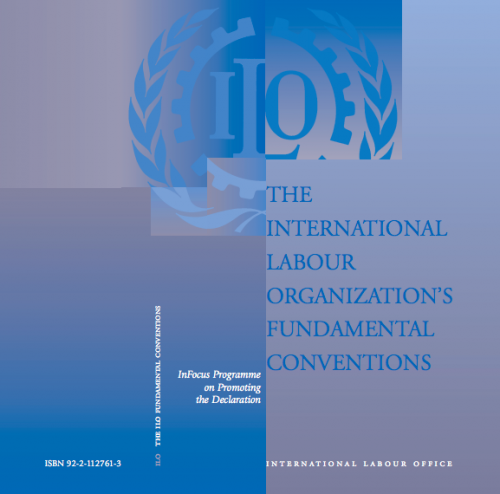 The ILO is the UN organisation responsible for setting and monitoring international labour standards. The ILO has identified eight conventions covering subjects they consider to be fundamental principles and rights at work. These are at times referred to as the core labour standards: ● Freedom of Association and Protection of the Right to Organise Convention, 1948 (No. 87) ● Right to Organise and Collective Bargaining Convention,1949 (No. 98) ● Forced Labour Convention, 1930 (No. 29) ● Abolition of Forced Labour Convention, 1957 (No. 105) ● Minimum Age Convention, 1973 (No. 138) ● Worst Forms of Child Labour Convention, 1999 (No. 182) ● Equal Remuneration Convention, 1951 (No. 100) ● Discrimination (Employment and Occupation) Convention, 1958 (No. 111)
The ILO is the UN organisation responsible for setting and monitoring international labour standards. The ILO has identified eight conventions covering subjects they consider to be fundamental principles and rights at work. These are at times referred to as the core labour standards: ● Freedom of Association and Protection of the Right to Organise Convention, 1948 (No. 87) ● Right to Organise and Collective Bargaining Convention,1949 (No. 98) ● Forced Labour Convention, 1930 (No. 29) ● Abolition of Forced Labour Convention, 1957 (No. 105) ● Minimum Age Convention, 1973 (No. 138) ● Worst Forms of Child Labour Convention, 1999 (No. 182) ● Equal Remuneration Convention, 1951 (No. 100) ● Discrimination (Employment and Occupation) Convention, 1958 (No. 111)Credit: Copyright © International Labour Organization, 2002
-
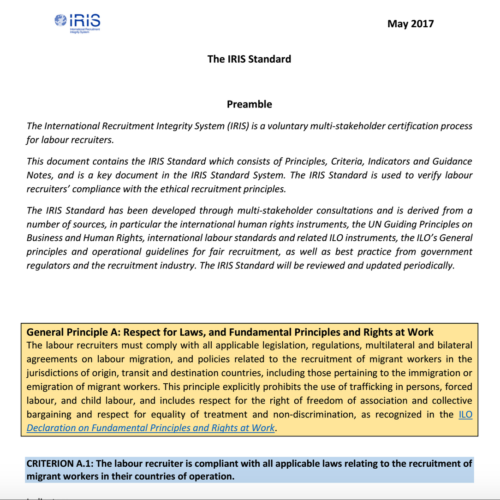 The International Recruitment Integrity System is a voluntary, multi-stakeholder certification system seeking to implement ethical recruitment standards. The Code of Conduct was established by IRIS as part of these efforts. There are 2 General Principles: Respect for Laws, and Fundamental Principles and Rights at Work Respect for Ethical and Professional Conduct It includes 5 Principles:
The International Recruitment Integrity System is a voluntary, multi-stakeholder certification system seeking to implement ethical recruitment standards. The Code of Conduct was established by IRIS as part of these efforts. There are 2 General Principles: Respect for Laws, and Fundamental Principles and Rights at Work Respect for Ethical and Professional Conduct It includes 5 Principles:- prohibition of recruitment fees to jobseekers
- respect for freedom of movement
- respect for transparency of terms and conditions of employment
- respect for confidentiality and data protection
- respect for access to remedy
Credit: International Recruitment Integrity System (IRIS)
-
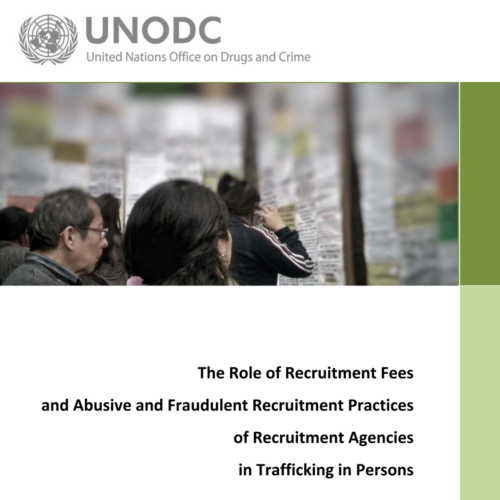 This report gives an overview of a UNODC study which sought to address the linkages between abusive recruitment practices and trafficking in persons, including: - Relevant international legal frameworks, - National law, regulation and institutional mechanisms - Law enforcement and criminal justice - Voluntary initiatives including the role of business - Recommendations - Case Studies
This report gives an overview of a UNODC study which sought to address the linkages between abusive recruitment practices and trafficking in persons, including: - Relevant international legal frameworks, - National law, regulation and institutional mechanisms - Law enforcement and criminal justice - Voluntary initiatives including the role of business - Recommendations - Case StudiesCredit: United Nations Office on Drugs and Crime (UNODC)
-
 Polaris is a US-based anti-slavery NGO. They gather stories of survivors of human trafficking in different settings. The Typology of Modern Slavery they have created breaks down human trafficking into categories based on industry, providing solutions for tackling the crime based on the characteristics of each.
Polaris is a US-based anti-slavery NGO. They gather stories of survivors of human trafficking in different settings. The Typology of Modern Slavery they have created breaks down human trafficking into categories based on industry, providing solutions for tackling the crime based on the characteristics of each.Credit: Polaris Project
-
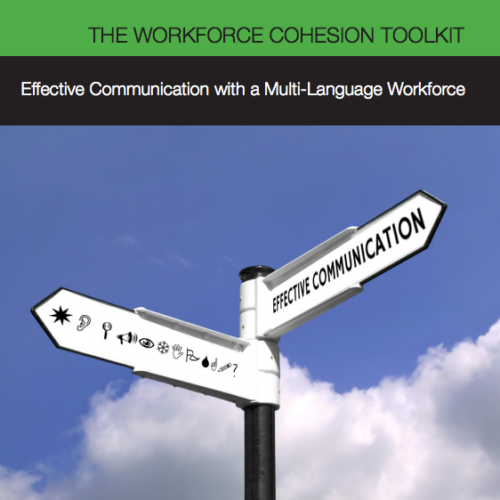 Stronger Together is a multi-stakeholder initiative which aims to reduce modern slavery. It provides guidance, training and resources to organisations, employers, labour providers, workers and their representatives. This free collection of resources includes pragmatic guidance and toolkits, and resources for the workplace including multilingual posters, leaflets and template policies. This Toolkit is intended to provide practical guidance and advice to managers on how to communicate with their workforce where more than one language is spoken. The guide is not intended to be a definitive guide, but rather gathers together advice to provide insight on how companies have successfully navigated communications issues. It includes both tips on language use and on understanding cultural difference, and illustrates practical advice through the use of case studies.
Stronger Together is a multi-stakeholder initiative which aims to reduce modern slavery. It provides guidance, training and resources to organisations, employers, labour providers, workers and their representatives. This free collection of resources includes pragmatic guidance and toolkits, and resources for the workplace including multilingual posters, leaflets and template policies. This Toolkit is intended to provide practical guidance and advice to managers on how to communicate with their workforce where more than one language is spoken. The guide is not intended to be a definitive guide, but rather gathers together advice to provide insight on how companies have successfully navigated communications issues. It includes both tips on language use and on understanding cultural difference, and illustrates practical advice through the use of case studies.Credit: ALP, The Co-operative Food, Poultec,Workforce Cohesion Alliance - shared by Stronger Together
-
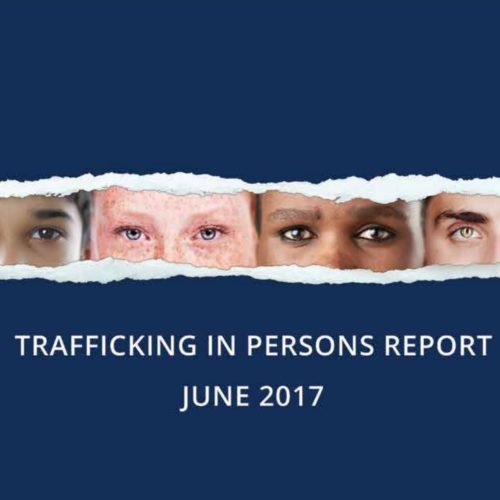 The Trafficking in Persons Report, or TIP Report, is an annual report issued by the U.S. State Department's Office to Monitor and Combat Trafficking in Persons. It provides countrywide statistics on Human Trafficking including definitions, themes and case studies. It ranks governments based on their perceived efforts to acknowledge and combat human trafficking.
The Trafficking in Persons Report, or TIP Report, is an annual report issued by the U.S. State Department's Office to Monitor and Combat Trafficking in Persons. It provides countrywide statistics on Human Trafficking including definitions, themes and case studies. It ranks governments based on their perceived efforts to acknowledge and combat human trafficking.Credit: United States of America Department of State
-
 This guide provides support for hotel owners to uphold and protect human rights in their business and understand risk areas. It includes information and case studies about risk areas, tools and instruments to help companies adhere to the law and implement good practice, and a step-by-step guide for companies to meet the responsibility to respect human rights.
This guide provides support for hotel owners to uphold and protect human rights in their business and understand risk areas. It includes information and case studies about risk areas, tools and instruments to help companies adhere to the law and implement good practice, and a step-by-step guide for companies to meet the responsibility to respect human rights.Credit: University of Liverpool
-
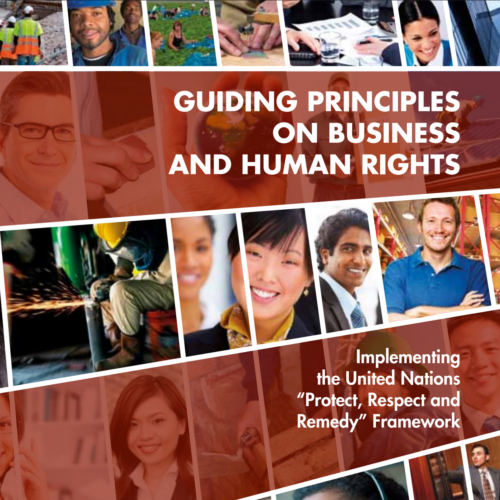 The Guiding Principles seek to provide an authoritative global standard for preventing and addressing the risk of adverse human rights impacts linked to business activity. See The Corporate Responsibility to Respect Human Rights which is the official guidance to support effective implementation of the Guiding Principles.
The Guiding Principles seek to provide an authoritative global standard for preventing and addressing the risk of adverse human rights impacts linked to business activity. See The Corporate Responsibility to Respect Human Rights which is the official guidance to support effective implementation of the Guiding Principles.Credit: UN
-
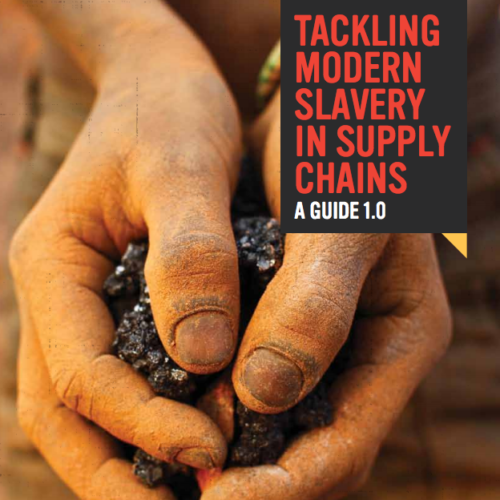 The Walk Free Foundation was established by Andrew Forrest, the Chairman of Fortescue Metals Group, after he found labour exploitation within his own supply chains and took a number of steps to prevent modern slavery affecting his business. This comprehensive guide considers corporate policy on modern slavery and provides both guidance and tools to implement it. It includes advice on corporate policy and provides template examples of a number of tools.
The Walk Free Foundation was established by Andrew Forrest, the Chairman of Fortescue Metals Group, after he found labour exploitation within his own supply chains and took a number of steps to prevent modern slavery affecting his business. This comprehensive guide considers corporate policy on modern slavery and provides both guidance and tools to implement it. It includes advice on corporate policy and provides template examples of a number of tools.Credit: Walk Free Foundation & Verite
-
 Stronger Together is a multi-stakeholder initiative which aims to reduce modern slavery. It provides guidance, training and resources to organisations, employers, labour providers, workers and their representatives. This free collection of resources includes pragmatic guidance and toolkits, and resources for the workplace including multilingual posters, leaflets and template policies. This 12 point checklist lists actions for both employers and labour providers such as corporate policy improvement, workplace awareness-raising initiatives and steps to ensure supply chain transparency.
Stronger Together is a multi-stakeholder initiative which aims to reduce modern slavery. It provides guidance, training and resources to organisations, employers, labour providers, workers and their representatives. This free collection of resources includes pragmatic guidance and toolkits, and resources for the workplace including multilingual posters, leaflets and template policies. This 12 point checklist lists actions for both employers and labour providers such as corporate policy improvement, workplace awareness-raising initiatives and steps to ensure supply chain transparency.Credit: Stronger Together
-
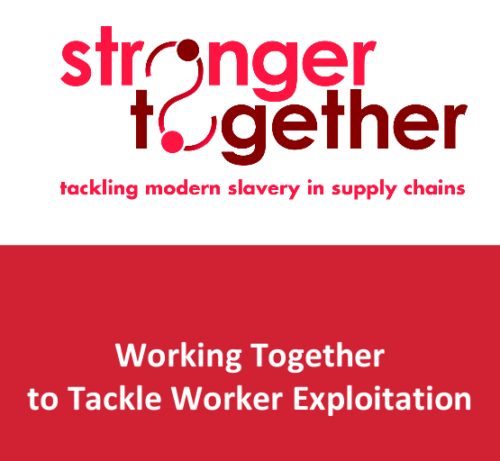 Stronger Together is a multi-stakeholder initiative which aims to reduce modern slavery. It provides guidance, training and resources to organisations, employers, labour providers, workers and their representatives. This free collection of resources includes pragmatic guidance and toolkits, and resources for the workplace including multilingual posters, leaflets and template policies. This template is to be modified as required and for inclusion with a wider Tackling Modern Slavery in Business and Supply Chain or Business Human Rights Policy.
Stronger Together is a multi-stakeholder initiative which aims to reduce modern slavery. It provides guidance, training and resources to organisations, employers, labour providers, workers and their representatives. This free collection of resources includes pragmatic guidance and toolkits, and resources for the workplace including multilingual posters, leaflets and template policies. This template is to be modified as required and for inclusion with a wider Tackling Modern Slavery in Business and Supply Chain or Business Human Rights Policy.Credit: Stronger Together
-
 Stronger Together is a multi-stakeholder initiative which aims to reduce modern slavery. It provides guidance, training and resources to organisations, employers, labour providers, workers and their representatives. This free collection of resources includes pragmatic guidance and toolkits, and resources for the workplace including multilingual posters, leaflets and template policies. This template is to be modified as required and for inclusion with a wider Tackling Modern Slavery in Business and Supply Chain or Business Human Rights Policy.
Stronger Together is a multi-stakeholder initiative which aims to reduce modern slavery. It provides guidance, training and resources to organisations, employers, labour providers, workers and their representatives. This free collection of resources includes pragmatic guidance and toolkits, and resources for the workplace including multilingual posters, leaflets and template policies. This template is to be modified as required and for inclusion with a wider Tackling Modern Slavery in Business and Supply Chain or Business Human Rights Policy.Credit: Stronger Together
-
 Stronger Together is a multi-stakeholder initiative which aims to reduce modern slavery. It provides guidance, training and resources to organisations, employers, labour providers, workers and their representatives. This free collection of resources includes pragmatic guidance and toolkits, and resources for the workplace including multilingual posters, leaflets and template policies. This template is to be modified as required and for inclusion with a wider Tackling Modern Slavery in Business and Supply Chain or Business Human Rights Policy.
Stronger Together is a multi-stakeholder initiative which aims to reduce modern slavery. It provides guidance, training and resources to organisations, employers, labour providers, workers and their representatives. This free collection of resources includes pragmatic guidance and toolkits, and resources for the workplace including multilingual posters, leaflets and template policies. This template is to be modified as required and for inclusion with a wider Tackling Modern Slavery in Business and Supply Chain or Business Human Rights Policy.Credit: Stronger Together
-
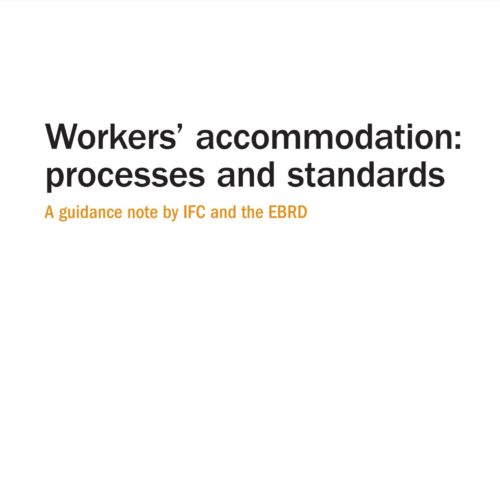 This Guidance Note is written by the EBRD, an international financial institution, and the IFC, a member of the World Bank Group, which creates opportunity for people to escape poverty and improve their lives. It is aimed at providing practical guidance to IFC and EBRD specialists, consultants and clients on the processes and standards that should be applied to the provision of workers’ accommodation in relation to projects funded by IFC or the EBRD. The Guidance Note also provides examples of good practice approaches that businesses have successfully applied in their operations.
This Guidance Note is written by the EBRD, an international financial institution, and the IFC, a member of the World Bank Group, which creates opportunity for people to escape poverty and improve their lives. It is aimed at providing practical guidance to IFC and EBRD specialists, consultants and clients on the processes and standards that should be applied to the provision of workers’ accommodation in relation to projects funded by IFC or the EBRD. The Guidance Note also provides examples of good practice approaches that businesses have successfully applied in their operations.Credit: International Finance Corporation & the European Bank for Reconstruction and Development
-
 This leaflet, created by the Heath and Safety Executive (HSE) is aimed at employers who provide work experience opportunities to young people. The HSE is the body responsible for the encouragement, regulation and enforcement of workplace health, safety and welfare, and for research into occupational risks in Great Britain. All HSE publications, whether priced or non-priced, are subject to Crown Copyright. The Government encourages the re-use of public information. Crown copyrighted material may be used and re-used free of charge in any format or medium, subject to the following conditions: An acknowledgement to the source of the Information must be provided by including the following attribution statement and hyperlink: 'Contains public sector information published by the Health and Safety Executive and licensed under the Open Government Licence v1.0'. www.nationalarchives.gov.uk/doc/open-government-licence/ '
This leaflet, created by the Heath and Safety Executive (HSE) is aimed at employers who provide work experience opportunities to young people. The HSE is the body responsible for the encouragement, regulation and enforcement of workplace health, safety and welfare, and for research into occupational risks in Great Britain. All HSE publications, whether priced or non-priced, are subject to Crown Copyright. The Government encourages the re-use of public information. Crown copyrighted material may be used and re-used free of charge in any format or medium, subject to the following conditions: An acknowledgement to the source of the Information must be provided by including the following attribution statement and hyperlink: 'Contains public sector information published by the Health and Safety Executive and licensed under the Open Government Licence v1.0'. www.nationalarchives.gov.uk/doc/open-government-licence/ 'Credit: Health and Safety Executive

